Mahaprasad
An incredible spiritual experience - that's what Jagannath's Mahaprasad offers! The divine taste and blessing of this offering are simply unmatched.
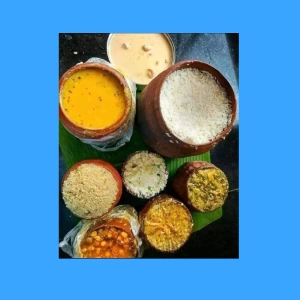
Mahaprasad is a unique offering of 56 bhogs to Lord Jagannath. Consuming Mahaprasad can bring spiritual and physical benefits to its partakers. This article will explore the significance of Mahaprasad and how it connects to Lord Jagannath. It will also discuss some of the rituals associated with this offering and why it is considered so important by devotees of Lord Jagannath.
Why is it called Mahaprasad?
Only the offerings made at three sacred temples - Puri Jagannath, Tirupati, and Ananta Basudev in Bhubaneswar - are referred to as Mahaprasad. This is because of the astounding variety of dishes offered. At Puri Jagannath, 56 delicious bhogs are offered every day. On Makar Sankranti, 84 dishes are offered in addition to this.
How food is cooked in Jagannath Temple?
Food cooked in any kitchen cannot be considered as Mahaprasad. In the kitchen of Puri Jagannath temple, cooking starts only after performing homa following Vaishnava rites. It is necessary that the count of pots and ovens should be a multiple of 9. The oven is lit according to Vaishnavagni rituals. Jagannath and Lakshmi Devi are both present in the sacred fire in which Mahaprasad is cooked. It is believed that Lakshmi Devi herself is the chief cook in the kitchen
Amazing facts about Puri Jagannath temple kitchen
- The traditional kitchen called Rosagara prepares over 500 delicious dishes.
- Food is cooked in earthen pots called Kudua.
- Water is taken from two wells called Ganga and Jamuna.
- Every day food for 5000 to 10000 people is cooked.
- On special occasions, the number can go up to 1 million.
- Except for the Suaras (traditional cooks) and assistants, nobody can enter the kitchen.
- 500 cooks and 500 assistants work in the kitchen.
- Even among the assistants, only about 300 called the Joganias are allowed to enter the kitchen.
- It has got 32 rooms and 240 ovens.
- The fire in the kitchen is never put out.
- Every day, new earthen pots are used.
Mahaprasad is Jagannath himself
Mahaprasad is considered to be the embodiment of Brahman itself. The Vedic proclamation - annam brahmeti vyajanat (Understand that food is Brahman itself) is emphasized in the tradition of Mahaprasad. People revere Mahaprasad as if it were Jagannath himself. Swearing by it is often used to settle arguments and disputes. The nirmalya, which is the dried cooked rice, is taken home by devotees and preserved as a token of Jagannath's presence in their home. This often holds great significance in their lives. In Orissa, they have a remarkable tradition of taking some nirmalya before their meals. Every Karthik month, thousands of widows from all over the country gather at Puri to partake in the divine Mahaprasad every day.
Story of Mahaprasada
During the rule of Yayati, Brahmins and Sanyasis stopped taking Mahaprasad since it was being distributed to everyone irrespective of their caste and creed.
Jagannath appeared in the dream of Yayati to tell Brahmins and Sanyasis to come to the temple and partake in the Mahaprasad.
When Yayati told them, they said - we will come only if Jagannath instructs us directly. We don’t know whether you are telling the truth.
He had instructed Indradyumna to conduct the 12 monthly festivals directly.
At that time, a dumb Brahmin came there.
The Brahmins and Sanyasis said - we will believe if Mahaprasad can make him talk.
The dumb Brahmin took Mahaprasad and started talking -
Are vidwanmanyānanadhigata vedärthanigamän
Maya bhukte hyanhe mama parijaneisced mamānujey
Tasmin dehe nasinnabhavatu bhabanto bahughruṇā.
Na gangayah peyam Saba-Tanu-Galat Nabya Kalitaṁ.
Oh, you self-proclaimed intellectuals who are ignorant of the teachings of Veda and other scriptures!
I receive blessings from Lord when I take Mahaprasada and it also spreads joy to my family members.
Just as Ganga does not become impure because corpses are put into it, Mahaprasada also stays pure irrespective of who partakes in it.
Astonished by this, Brahmins and Sanyasis started partaking in the Mahaprasada thereafter.
Lord Agneswara
It is a small Shiva temple on the right side of the passage through which the bhogs are taken to the Ratna Vedi. Agneswara Mahadeva is the protector of the fire in the kitchen. He also compensates for any shortcoming in the offerings as they are carried in front of him.
The mysterious dog that flags impurity
Dogs are never seen inside the temple complex. But if the food has turned impure or Lakshmi Devi is not satisfied with the quality, then a dog appears out of nowhere. It is a Goddess called Kutama Chandi. Then everything is buried and cooking starts all over again. Then the dog disappears.
Role of Vimala Devi
Vimala Devi is the Bhairavi of Jagannath. She is Goddess Parvathy. All the bhogs offered to Jagannath (ucchishta) are offered to Vimala Devi. Then only they are distributed among devotees.
4 types of cooking
- Bhimapaka - Badatiana, Gudakhuara, Pakala Nadia Rasa, Purapitha, Biripitha and Gudakanji, etc.
- Nalapaka - Sakara, Tianalapara, Adanga and different types of sweet drinks, etc.
- Souripaka - Mahura, Deshialubhaja, Kadalibhaja, Adapachedi, Ghialabanga and varieties of cakes, etc.
- Gouripaka - Mugatiana, Leutia, Kosala and Madhura Lalita Saga, etc.
4 Types of rice
- Salianna - Sunakhila rice cooked along with ghee and Phalatabha Kharada Lavana.
- Khiraanna: Basumati rice, cow milk, ghee and Kharada Lavana are mixed and cooked.
- Dadhianna: Plain rice mixed with curd.
- Sitalaanna: Rice mixed with Tabharasa and Kharada Lavana.
Which vegetables are not allowed in Jagannath Temple?
- Potato
- Tomato
- Cauliflower
- Cabbage
- Ladies finger
- Drumstick
- Onion
- Garlic
- Coriander
- Green chili
- Red chili
- Beans
- Bitter gourd
- Carrot
- Turnip
- Beetroot
- Corn
- Green peas
- Mushroom
- Capsicum
- Papaya
- Snake gourd
- Bottle gourd
Placing bhogs before the deities
In the kitchen, all dishes are prepared with utmost devotion and reverence, and served to the deities with an air of grandeur. Those who carry it from the kitchen are the Suaras and Mahasuaras. These people are strong and healthy, free from any illnesses. Their mouths are covered so as to prevent any kind of contamination from droplets, saliva and even direct breath. Impressed by their discipline, the pilgrims watch in awe as the carriers move in a line, carrying the Mahaprasad on their shoulders with a yoke. Of course, visitors are not allowed to touch them. The Suaras reverently carry the dried Mahaprasad in Sara - an earthen platter shaped like a round plate - on the open palms of their hands.
Every time Dhupa is offered, a special temple attendant called Padhihari will enter the kitchen and start and call the Suaras and Mahasuaras -
Oh, Suaras and Mahasuras! Let the Amruta Manohi Bhogas be brought to the presence of their holiness!
After this, the bhogs are carried to the deities.
How to get Puri Jagannath Temple Mahaprasad?
Devotees can get Mahaprasad in Ananda Bazar which is the food mart of Jagannath Temple. It is in the northeast corner of the outer enclosure of the temple complex. They can also place mass orders for large gatherings.
Dhupas - the divine meals
|
Dhupa |
Items |
|
Morning |
Gopala Vallabha, fried paddy, sugar-coated coconut, nuts, butter, khua, manda papudi, fruits like mango, banana, guava, coconut chips, etc. For morning meals which is called Raja Dhupa, the deities are offered as follows: Kakatuajhilli, Kanti, Enduri, ginger tonic, fried green leaves, fried rice, dal, and curries. |
|
Fore-noon |
Bhoga - Mandapa - Dhupa. It includes rice, various curries, and cakes. |
|
Mid-day & afternoon |
Oriya made of rice, salt, ghee, and orange juice, cooked rice, curries, cakes, sweet soup, Kakara, Arisa, Marica-Ladu, pomegranates, Bada, a drink prepared out of black pepper, banana, etc. |
|
Evening |
The Sandhya dhupa consists of cooked rice and watered rice, Matha- puli, Kanla puli, Jenamani, Parijataka, Mandua, Rasavali, Suari, dal and other curries, etc. |
|
Night |
Badasinhara Dhupa or Sayana Dhupa - sweet watered rice, banana, Bada, banana fry, Bhoga Kshiri, a liquid made of rice milk, sugar, and spices, cadhei meda, green coconuts, and betels (sandal paste instead of lime and without tobacco). |
List of 56 bhogs
- Sadha Anna
- Kanika
- Dahi Pakhal
- Ada Pakhal
- Thali Khechedi
- Ghea Anna
- Khechedi
- Mitha Pakhal
- Oria Pakhal
- Khaja
- Gaja
- Ladu
- Magaja Ladu
- Jeera Ladu
- Jagannath Ballav
- Khuruma
- Mathapuli
- Kakara
- Marichi Ladu
- Luni Khuruma
- Suar Pitha
- Chadai Lada
- Jhilli
- Kanti
- Manda
- Amalu
- Puri
- Luchi
- Bara
- Dahi Bara
- Arisa
- Tripuri
- Rosapaik
- Khiri
- Papudi
- Khua
- Rasabali
- Tadia
- Chhena Khai
- Bapudi Khaja
- Khua Manda
- Sarapulli
- Dali
- Biri dali
- Urid Dal
- Muga Dal
- Dalama
- Maur
- Besar
- Sag
- Potala Rasa
- Goti Baigana
- Khata
- Raita
- Pita
- Baigilni
Why potato is not used in Jagannath Temple?
All vegetables of foreign origin are avoided in the Mahaprasad of Puri Jagannath temple. Potato was introduced in India by the Portuguese in the 17th century.
Is Mahaprasad available throughout the day?
At Ananda Bazar, Mahaprasad is available throughout the day. But fresh prasad of the day will be available after 2 pm. All items may not be available with every vendor. You will have to scout around a bit.
Quiz
Who is the protective Goddess of Govardhan Mutt, Puri?Recommended for you
Dhritarashtra Was Sure Kauravas Would Lose The War
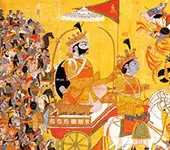
This disourse part of Mahabharata series tells you about- 1. How Rajasuya made Duryodhana jealous. 2. How Dhritarashtra was certain about defeat of Ka....
Click here to know more..Do you know how Mooshaka became the vehicle of Lord Ganesha?
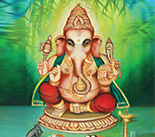 Click here to know more..
Click here to know more..
Ashtalakshmi Stuti
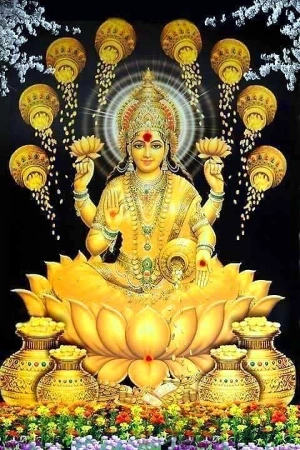
vishnoh' patneem komalaam kaam manojnyaam padmaaksheem taam muktidaanapradhaanaam. shaantyaabhooshaam pankajasthaam suramyaam sri'sht'yaadyantaamaadil....
Click here to know more..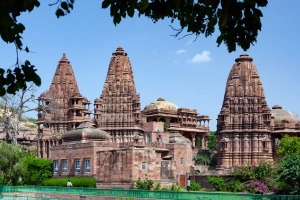
English Topics
Temples
Click on any topic to open
- 71 Ahobilam - Lord Narasimha's Sacred Abode
- 70 Malaikottai Temple, Trichy - Discover Spiritual Bliss
- 69 Jambukeswarar Temple, Trichy
- 68 Vaitheeswaran Koil - A Healing Pilgrimage
- 67 Dwaraka and Somnath
- 66 Khidkali Mahadev Mandir
- 65 Pongu Sani Temple, Thirukollikadu
- 64 The Unique And Fascinating Jharni Narasimhaswamy Temple, Bidar
- 63 Yamunotri: A Spiritual Haven in the Himalayas
- 62 Anantha Padmanabha Swamy Temple - Fascinating Legends
Please wait while the audio list loads..
30
Ganapathy
Shiva
Hanuman
Devi
Vishnu Sahasranama
Mahabharatam
Practical Wisdom
Yoga Vasishta
Vedas
Rituals
Rare Topics
Devi Mahatmyam
Glory of Venkatesha
Shani Mahatmya
Story of Sri Yantra
Rudram Explained
Atharva Sheersha
Sri Suktam
Kathopanishad
Ramayana
Mystique
Mantra Shastra
Bharat Matha
Bhagavatam
Astrology
Temples
Spiritual books
Purana Stories
Festivals
Sages and Saints
